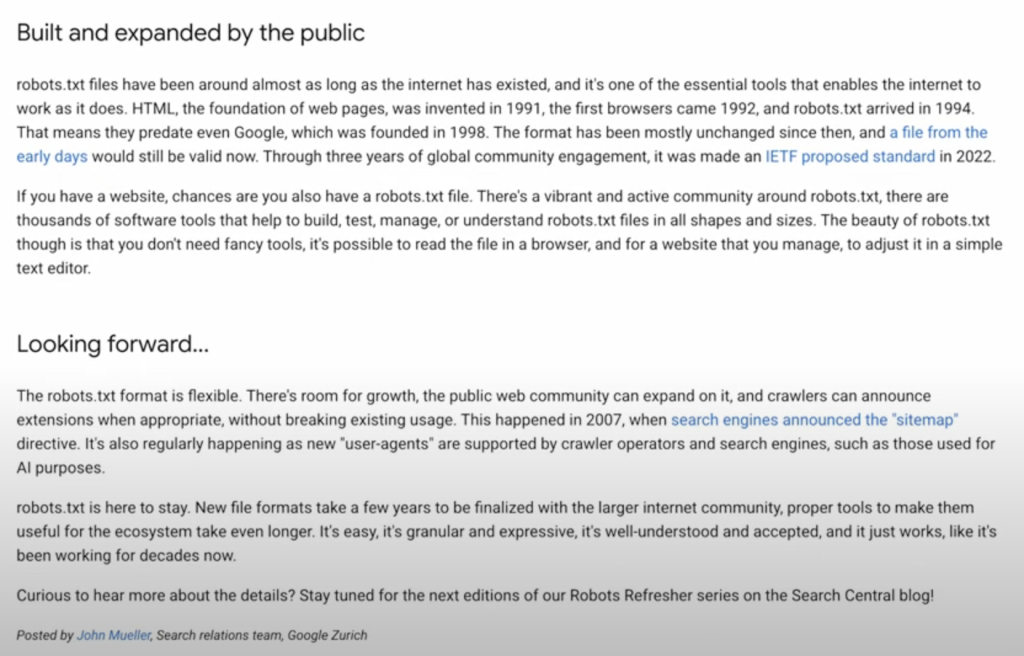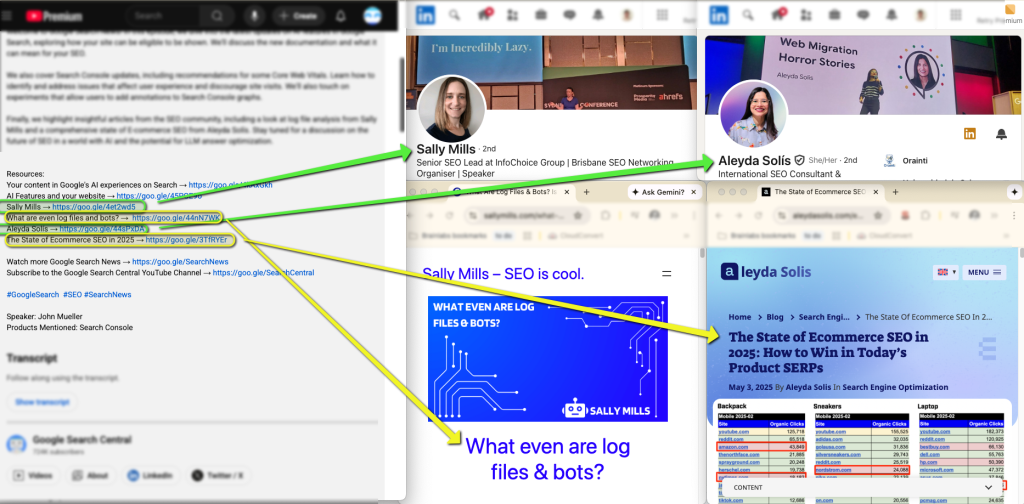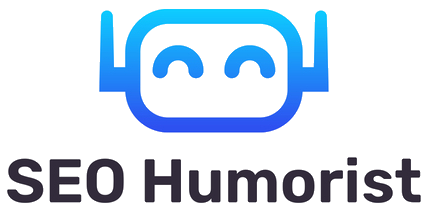It’s probably my armchair days of watching LOST that’s got me doing this; or the modern, deliberate Easter Eggs of movie trailers. In any case, I do believe 60% of this is intentional. The other is free play of the mind. Let’s dive in!
Google Talks About AI Mode:
0:52 seconds in, John Mueller zips to AI Mode:

OpenAI did this too with that “let us do the shopping for you” ad, but all direct LLM platforms seem to recognize the — what’s now been dubbed — conversational query shift. The 4-5 word query searches (in a traditional search engine) that pervaded Google’s Search (from Boomers to Millennials) has shifted to the much longer (~23 word queries) in LLMs (SEMRush). Just showing that they get it.
Within this section, John Muller goes on to say:
AI Mode is helpful for queries where further exploration, reasoning, or complex comparisons are needed.
Again, while all LLMs are different — and yes, I’m drawing a thin correlative path between Anthropic being partly funded by Google — the complex comparisons echoes what we learned in the Claude Leak; namely that the LLM (Claude) won’t search online unless it’s queried for research — one such example being complex comparisons.

Google’s March 2018 Core Algo Update Still Applies
1:18 – As he’s been saying for the better part of a decade, John Mueller (operating with his Search Liaison hat on), reminds webmasters and SEOs that they do not need to fix or do anything and the only reason they’re bringing any of this up is because they too keep getting asked.
With each algo update, since March 2018, Google’s been clear: there’s nothing to fix, if you see a decrease in rankings, it’s because you’re not deemed relevant; if you were ranking before, that was likely a bug that’s been corrected, i.e. nothing to fix. Be authentic, build relationships and have a unique point of view.
At least since 2016, I can comfortably say that that has been true and continues to be trues and the people who tend to complain about it are the bad actors; people who do all the SEO, unaware they, you and I can feel the affectation. It’s the same way I feel when I hear “strategy” and it’s really just someone’s way of acting like whatever they’re about to talk about has some top-shelf vibe.
Derek Digresses: To this end, I gotta reiterate my favorite definition of Strategy. Michael Porter’s “The essence of strategy is choosing what NOT to do” — but more on that in a future post.
Google Talks AIO:
1:40 –
[O]ne effect… that we’ve seen is that when people click to a website from search results pages with AI Overviews, these clicks are of higher quality, where users are more likely to spend more time on the site.
Here’s where I start to read between the lines. Not only do I believe this is true. But yet again, it echoes EEAT and how you need to have a point of view. If you were to focus solely on facts or FAQs, Google (and users) will get the answer, and move on. Meanwhile, what will trigger someone to click (beyond simply transactional queries) is someone who was triggered and now they’re seeking to validate or invalidate their view.
I like everything about this because it levels the playing field. If your brand, simply cannot participate in presenting an opinion — you’re wrong, but that’s besides the point — then you’re encouraged to create content that fosters interact-able-ness (be it a game or flexible form or video); these all require significantly more investment and thought to generate. Because the alternative is you write text with a point-of-view — which for many brands is much MUCH harder.
Have an opinion, write it down, and put your name on it. What’s it mean? If you’re being cited, people who agree are gonna want to know more, get more details from other topics where they also agree or are comfortably challenged. If they disagree, they’re also gonna want to know more, find out who you are and why you have the opinion you do.
You see this all the time on reddit. A user makes a bold-faced claim and bam, someone checks their post and comment history to invalidate them. It may be aggressive, but it’s also a clear sign of engagement.
My recco is not make people mad but the thing is, you (and your business) are FINISHED trying to market to everybody. Market to your audience and your people.
AI Features in Search
2:20 –
Look at the search results relevant to your site and consider where you can add unique value… Give users a reason to visit your website, encourage them to come back and recommend it to others.
Well if this ain’t what I’ve been bellowing for years. A good on-page strategy leads to a good off-site strategy. This was something that first triggered me back when people were gung ho about adding Facebook share buttons to posts — as though users were unwilling to copy a URL and paste it to their friends manually in their Facebook.
This is also a nod that your off-page visibility MATTERS.
Search Console Updates
2:50 –
Note a ton to talk about in detail here, only that they’re testing new insights and ask that you like or dislike so they can improve it.

It’s followed up with how you can manually add annotations to your Search Console. I’m not altogether sure what to make of this yet, but as someone who has added annotations in UA, seoClarity and in a Gsheet, I’m curious if this is simply to provide another lever to pull to track impacts.
Robots Exclusion Protocol
3:51 –
This is a little interesting sampler of knowledge. John mentions this is how you can tell crawlers which parts of the site to crawl or and which not to crawl or which not to crawl for AI training purposes. On it’s own, this didn’t send up any alarms, but then John intentionally mentions he’s updated the Robots.txt page and proceeds to walk us through it.

Just before the last paragraph, Mueller shouts out how robots was built and expanded upon by the public. He goes on to say robots.txt is flexible, and there’s room for growth among the community (not of SEOs but all webmasters) and crawlers can announce/add extensions.
It follows all this up with Sitemaps which were formally announced in 2007. But John says
[N]ew file formats take a few years to be finalized with the larger internet community… curious to hear more? Stay tuned…
If the last thing we all agreed upon was Sitemaps and that went live in 2007… and these new formats take a few years, I’m curious if there’s something that’s already in the works behind the scenes. This echoes what Martin talked about in an Off-the-Record podcast 2 months ago. He asked what you would standardize or standardize next — and while they didn’t really move beyond sitemaps, it’s interesting that they discussed it then, and John Mueller’s updated this article now.
Articles from the Community
4:23 –
To me, this is the DO AS I SAY; DO AS I DO. I can’t say with absolute certainty that backlinks are the biggest ranking factor. What I can say is Google has said Trustworthiness is the most important signal in EEAT. How do you improve your trustworthiness? With signals from trustworthy sources that say, you are trustworthy. Typically, this means building relationships, but whole companies have been founded under the notion that they can game the system. From my POV, that’s why the Algo Update text can — and largely has — remained the same since 2018. If you’re buying backlinks in an effort to boost your site and it’s “working”, that’s a bug and Google will catch it.
Anyway, with AI able to aggregate to get a better sense of brand identity, you cannot afford to sleep on off-page SEO. HOWEVER, with AI tools, it’s never been easier to programmatically scale this. That said, this section of the podcast seems like a ripe indicator that this is the most important piece.
To further illustrate this, John Mueller shouts out Sally Mills Log files and bots — and specifically says this is a skill that won’t go away as long as there are websites (i.e. this is evergreen, do it) and Aleyda Solís The State of Ecommerce SEO — which he also calls out is important so long as people use websites to buy things.
Google and co are demonstrating that they’re listening to the community and to further prove the point, they include — not just links to the articles, BUT (drum roll) to the authors’ LinkedIn profiles.

That’s such a boss EEAT move and a clear indicator to put a face to the blog. Don’t hide behind ghost writers, or catchall admin usernames. Put your name (either as writer or reviewer).
Quick One-Off Projects
Project Mariner – 5:35
This is another thing that was announced but DEEPLY underreported on following Google’s summit announcements. It’s a project where you can develop your own AI agent to work for you. It’s a bot you can program which sure sounds like that article from Sally Mills Log files and bots would be super relevant to Google’s Mariner project. 🤔
To tantilize our imaginations further, John literally says:
AI agents are a fascinating look into a potential future.
Very interesting, John.
AI Naming Conventions
6:20 – John also criticizes (albeit lighthearted) the community for trying to coin a new SEO word.

Though if you needed evidence there’s shady easter eggs, @alena4350 called out:

Since I’ve only seen LLMO, the “A” did stand out, but not until this person called it out. This absolutely looks like a John Mueller hilarious gag.
Mueller does also indicate he thinks “SEO” is fine as is, but is open to thoughts in the comments — which, he says something you almost never hear among influencers (echoing yet again audience matters), we read ALL the COMMENTS. So yeah, BE HEARD.
Derek Digresses: My POV, it should remain SEO. However, I think we change the meaning of the “E.” What we’re actually doing is Search EEAT Optimization which captures the spirit of what we’ve been doing for years as well as what we need to be doing going forward.
EEAT is more than on-site content, it’s everywhere content. You need a unique POV and you need to build relationships. Moreover, it turns each piece of the acronym into a standalone word. Search covers getting you found; EEAT covers content onsite and offsite, ranking signals within and outside your control; Optimization which is what you plan on doing about it.



